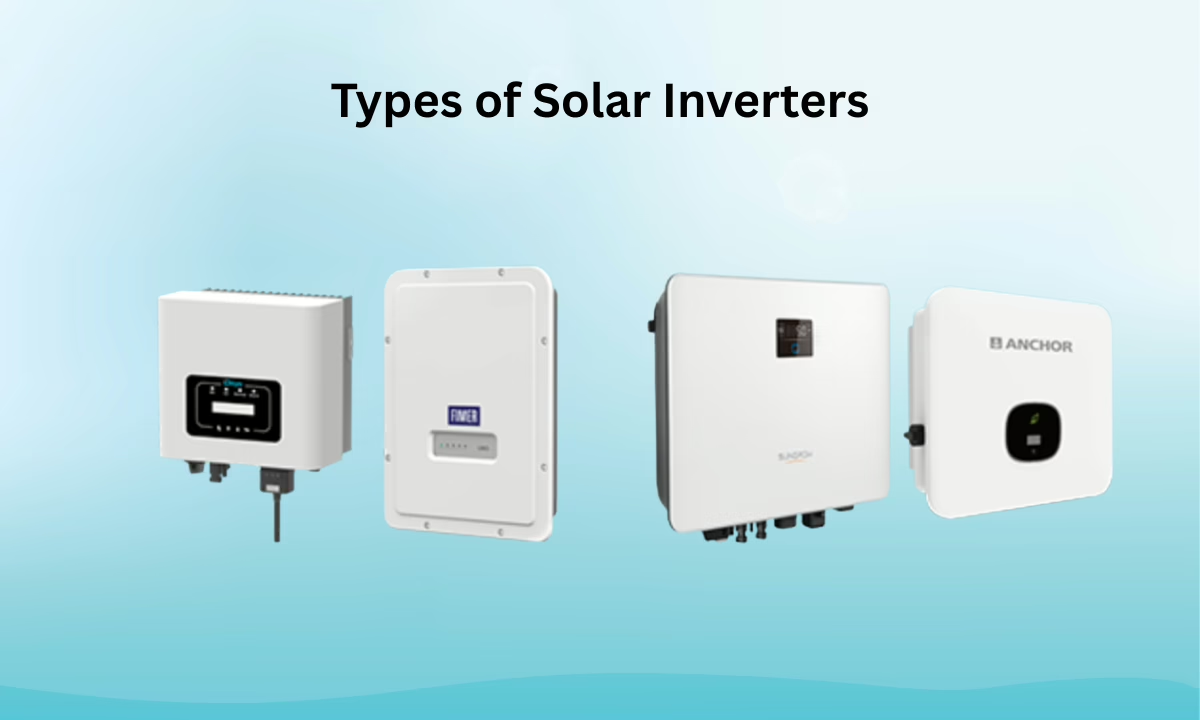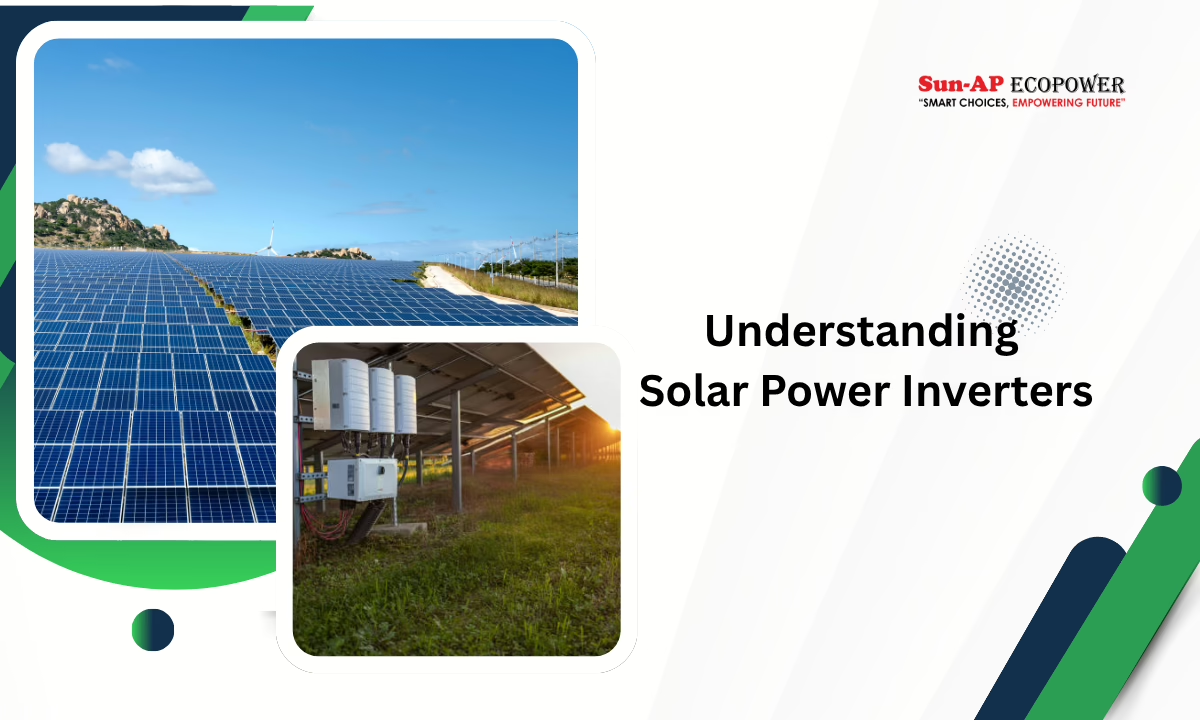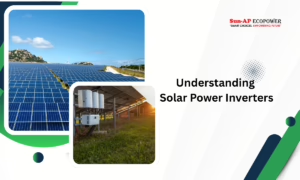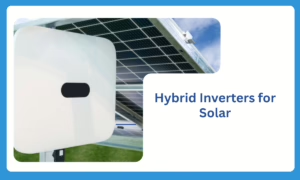A solar power inverter is one of the most crucial components of any solar energy system. It converts the direct current (DC) electricity generated by solar panels into alternating current (AC) electricity, which can be used to power your home or business.
Without a solar power inverter, the energy collected from the sun would remain unusable for your everyday appliances.
As homeowners increasingly invest in solar solutions across India, we at Sun-AP Ecopower often guide our clients on choosing the right inverter. Choosing the right inverter is essential, and finding reliable solar inverter dealers in India can make all the difference.
Let’s dive deeper and explore how these devices work and why they matter more than ever.
How Does a Solar Power Inverter Work?
A solar power inverter works by taking the DC electricity from solar panels and converting it into AC electricity. This process involves:
- Detection of voltage: The inverter senses the DC voltage from your solar panels.
- Conversion process: Using semiconductor components like transistors, the inverter converts DC to AC.
- Synchronization: For grid-connected systems, the inverter synchronizes the AC output with the utility grid’s frequency.
- Power optimization: Modern inverters use MPPT (Maximum Power Point Tracking) to extract maximum energy from solar panels, even during cloudy days or partial shading.
Example:
If your solar panels produce 500V DC, a solar inverter converts it to a standard 230V AC suitable for home use in India.
Tip: Always select an inverter that matches your solar panel capacity for maximum efficiency.
Types of Solar Inverters

Choosing the right type of solar inverter is essential, as it impacts both efficiency and cost. Here’s a quick breakdown of the common types:
| Type of Solar Inverter | How It Works | Best For |
|---|---|---|
| Solar On-Grid Inverter | Feeds electricity directly into the grid | Homes or businesses connected to the utility grid |
| Solar Off-Grid Inverter | Works with batteries for standalone systems | Remote areas without grid access |
| Solar Inverter with Battery | Combines an inverter and battery backup | Homes needing backup during power cuts |
| Hybrid Solar Inverter | Works on-grid and stores excess in a battery | Homes/businesses wanting both grid & backup |
Solar On-Grid Inverter
- A solar on-grid inverter is perfect for homeowners connected to the local electricity grid.
- The AC power produced can either be consumed immediately or fed back into the grid.
- Benefits include lower battery costs and the ability to sell excess electricity back to the utility company.
Example: A 5 kW on-grid system can reduce electricity bills drastically and even generate credit through net metering.
Solar Off-Grid Inverter
- For areas where grid access is unreliable or unavailable, a solar off-grid inverter is the ideal solution.
- It stores energy in batteries and supplies electricity independently.
- While initial costs are slightly higher due to batteries, it ensures uninterrupted power.
Tip: Ensure you calculate your daily electricity needs to choose a battery-backed inverter that can handle peak loads.
Solar Inverter with Battery
- A solar inverter with a battery offers the best of both worlds, converting solar energy to AC while storing excess power for nighttime or power cuts.
- These systems are particularly useful for homes with an unpredictable electricity supply.
Example: A 3 kW solar system with a 5 kWh battery ensures uninterrupted power for essential appliances like fans, lights, and refrigerators during outages.
Best Hybrid Solar Inverter in India
- The best hybrid solar inverter in India combines the benefits of on-grid and off-grid systems.
- It allows excess solar energy to charge batteries while also feeding the grid.
- Hybrid inverters are growing in popularity as they maximize energy usage and provide backup power.
Tip: Look for hybrid inverters with smart monitoring features, allowing you to track energy consumption and battery status from your smartphone.
Why Solar Inverters Matter
Solar inverters do more than just convert electricity. Here’s why they are critical for your solar system:
- Efficiency: Inverters optimize energy output using technologies like MPPT.
- Safety: They include safety features to prevent overloads and protect appliances.
- Grid Compliance: For on-grid systems, inverters ensure your home is synchronized with the utility grid.
- Monitoring: Many modern inverters provide real-time monitoring to track your system’s performance.
Benefits of Installing the Right Solar Inverter
Installing the right solar inverter can impact energy efficiency, cost savings, and system longevity. Here’s what you gain:
| Benefit | Description |
|---|---|
| Reduced Electricity Bills | Converts solar energy for immediate household use, reducing reliance on the grid |
| Backup Power | Battery-equipped or hybrid inverters provide power during outages |
| Long-Term Savings | Efficient inverters extend solar panel lifespan and reduce maintenance costs |
| Environmentally Friendly | Using solar energy lowers the carbon footprint |
How to Choose the Right Inverter
When selecting a solar inverter, consider these factors:
- System Type: On-grid, off-grid, or hybrid.
- Capacity: Match the inverter capacity to your solar panel output.
- Efficiency: Look for high-efficiency MPPT inverters.
- Warranty: Opt for inverters with at least 5-10 years of warranty.
- Dealer Reputation: Choose trusted solar inverter dealers in India for installation and after-sales support.
Example: If you have a 4 kW solar panel system, a 4 kW on-grid inverter with MPPT will be ideal.
Tips for Maintaining Your Solar Inverter
- Keep the inverter in a cool, dry place.
- Regularly clean the inverter’s vents to prevent overheating.
- Monitor energy output using built-in displays or apps.
- Schedule annual professional maintenance to ensure optimal performance.
Why Trust Us for Solar Inverters
Choosing the right solar inverter is not just about technology; it’s about trust. We at Sun-AP Ecopower are certified solar inverter dealers in India, and we ensure every installation is efficient, safe, and long-lasting.
With years of experience, we guide homeowners in selecting the perfect inverter type, whether it’s a solar on-grid inverter, a solar off-grid inverter, or the best hybrid solar inverter in India, ensuring maximum energy output.
Wrapping Up
In conclusion, a solar power inverter is the heart of your solar system. It converts energy, optimizes usage, and ensures a safe, reliable supply of electricity.
Selecting the right inverter and sourcing it through trusted solar inverter dealers in India can significantly impact your home’s energy efficiency, cost savings, and sustainability.
At Sun-AP Ecopower, we help homeowners across India make informed choices and install reliable solar inverters that provide uninterrupted power and long-term savings. Harness the sun efficiently, and let your energy work for you.
Frequently Asked Questions (FAQs)
Q1: How long does a solar inverter last?
A solar inverter typically lasts 10–15 years for on-grid models and 5–10 years for off-grid models, depending on usage and maintenance.
Q2: Can I install an inverter myself?
We recommend professional installation for safety, warranty compliance, and optimal performance. DIY setups may risk damage and reduce efficiency.
Q3: Do I need a battery with a solar inverter?
It depends on your needs. On-grid systems don’t require batteries, but off-grid and hybrid inverters benefit from battery backup during outages.
Q4: How much does a hybrid solar inverter cost in India?
Prices depend on capacity, brand, and features like monitoring and battery integration.
Q5: Can solar inverters work during cloudy days?
Yes, modern inverters with MPPT can extract maximum energy even during cloudy weather, though output may be slightly reduced.




